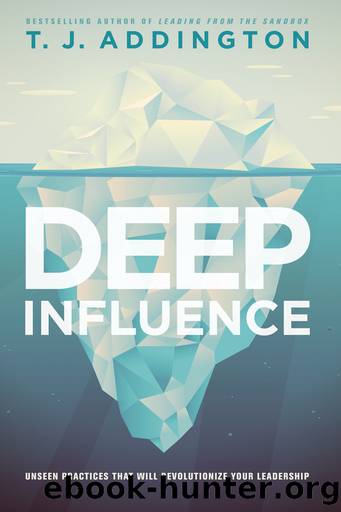Deep Influence by T. J. Addington

Author:T. J. Addington
Language: eng
Format: epub
Tags: RELIGION / Christian Church / Leadership
ISBN: 9781612918082
Publisher: The Navigators
Published: 2015-01-01T00:00:00+00:00
ENMESHMENT OR SELF-DEFINITION
A common issue related to low emotional intelligence is relational enmeshment. This happens when we allow ourselves to identify so closely with someone else that we take on his or her issue or offense as our own. This happens in families all the time: Two members of the family triangulate against a third, rather than dealing with problems directly. Tom has a conflict with Mary and talks to Sam about Mary. Sam takes up Tomâs offense and gangs up with Tom to pressure Mary into conformity. Sam has become enmeshed with Tom.
This happens in churches and workplaces frequently. It is a violation of Matthew 18:15; itâs the cowardâs way out of dealing with conflict. Rather than directly addressing the person with whom we have the conflict, we bring someone else into the equation and enmesh him or her in the problem. Rather than leading through deep influence, we are essentially using manipulation to get our way. This is not a fair way to compete in the world of ideas because healthy individuals will not respond in kind. And it inevitably divides people rather than unifying them.
Healthy individuals do not allow themselves to be drawn into other peopleâs conflicts, nor do they draw others into theirs. They may well seek to help other individuals solve their problems in a healthy manner, but they do not take on the offenses of others.
Often, unhealthy leaders triangulate or enmesh others in their issues by playing the victim role. They communicate their hurt to those who are sympathetic and draw those folks into their circle of pain, setting them against those whom they perceive to have wronged them. It is dangerous and harmful when pastors do this, because those they enmesh have no way of solving the issue since they are not a part of the dispute. So even when pastors resolve their original conflict, those they have enmeshed often continue to carry ill will toward the âoffendingâ party.
I have watched pastors divide their boards by choosing to triangulate with sympathetic board members against âthe enemies.â I have also seen unhealthy board members do the same thing. Long after the original problem is resolved, the board remains divided.
In contrast, a key component of high EQ is the ability to be âself-defined.â Self-defined individuals are comfortable with who they are. They can clearly articulate their own positions in a way that does not force others to agree and does not demonize those who disagree. They can say, âThis is what I think, and why. Now tell me how you see it.â In doing this, leaders make their position clear, along with their rationale, and open the door for honest conversation that can hopefully lead to a shared understanding.
A healthily self-defined leader can conduct dialogue even with those who strenuously disagree with him or her. Jeff can state his position but cannot stay connected relationally with those who disagree. Thus the conversation ends without any resolution. The ability to defend a position and stay connected with others who disagree is a key component to healthy relationships.
Download
This site does not store any files on its server. We only index and link to content provided by other sites. Please contact the content providers to delete copyright contents if any and email us, we'll remove relevant links or contents immediately.
| Ethics | Etiquette |
| Fashion & Image | Health & Stress |
| Motivation & Self-Improvement | Work Life Balance |
| Workplace Culture |
Tools of Titans by Timothy Ferriss(8347)
Change Your Questions, Change Your Life by Marilee Adams(7718)
Deep Work by Cal Newport(7040)
Playing to Win_ How Strategy Really Works by A.G. Lafley & Roger L. Martin(6186)
Man-made Catastrophes and Risk Information Concealment by Dmitry Chernov & Didier Sornette(5981)
Digital Minimalism by Cal Newport;(5740)
Big Magic: Creative Living Beyond Fear by Elizabeth Gilbert(5726)
The Slight Edge by Jeff Olson(5398)
Ego Is the Enemy by Ryan Holiday(5392)
The Motivation Myth by Jeff Haden(5191)
The Laws of Human Nature by Robert Greene(5136)
Stone's Rules by Roger Stone(5065)
Tuesdays with Morrie by Mitch Albom(4753)
Eat That Frog! by Brian Tracy(4499)
Rising Strong by Brene Brown(4431)
Skin in the Game by Nassim Nicholas Taleb(4224)
The Money Culture by Michael Lewis(4174)
Bullshit Jobs by David Graeber(4161)
Skin in the Game: Hidden Asymmetries in Daily Life by Nassim Nicholas Taleb(3973)
